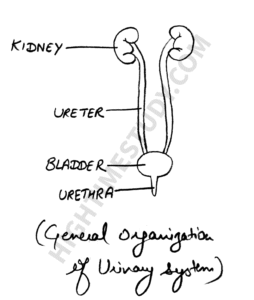The Urinary system consists of –
- Two Kidneys
- Two Ureters
- One Urinary Bladder
- One Urethra

The kidneys perform the major functions of the urinary system. Other parts of the urinary system are mainly passageways and storage regions.
Nephrology: (nephr = kidney)
Scientific study of anatomy, physiology and physiology of the kidneys.
Urology: (uro = urine)
Branch of medicine that deals with male and female urinary systems and male reproductive system.
Urinary system and Homeostasis
The urinary system contributes to homeostasis by –
- Altering blood composition, pH, volume and pressure.
- Maintaining blood osmolarity. (Osmolarity of a solution = Measure of total number of dissolved particles per litre of solution. The particles may be molecules, ions or mixture of both).
- Excreting wastes and foreign substances.
- Producing hormones.
Thereby, functions of the kidneys include:
- Regulation of blood ionic composition – Kidneys help in regulating the blood levels of several ions, mainly: Sodium ions (Na+), Potassium ions (K+), Calcium ions (Ca2+), Chloride ions (Cl–), Phosphate ions (HPO4 2-).
- Regulation of blood pH – Kidneys excrete a variable amount of hydrogen ions (H+) through urine and conserve bicarbonate ions (HCO3 –) which are an important buffer of hydrogen H+ in the blood.
- Maintenance of blood osmolarity – Kidneys separately regulate loss of water & loss of solutes in the urine, hence maintaining a relatively constant blood osmolarity nearly 300 mOsm/litre (milliosmoles per litre).
- Regulation of blood volume – By conserving or eliminating water in the urine, kidneys adjust blood volume. More the blood volume, more will be the blood pressure and lower the blood volume, lower will be the blood pressure.
- Production of hormones – Kidneys produce two hormones
- Calcitriol: active form of vitamin D (regulate calcium homeostasis.
- Erythropoietin: stimulates production of red blood cells.
- Regulation of Blood glucose levels: Like liver, kidneys can use glutamine (an amino acid) in gluconeogenesis (synthesis of new glucose molecules) and then release the glucose in the blood to help maintaining a normal blood glucose level.
- Excretion of wastes and foreign substances – By formation of urine, kidneys help in excretion of wastes produced from metabolic processes of body. Example: Ammonia and Urea (from deamination of amino acids); Bilirubin (from catabolism of hemoglobin); Creatinine (from breakdown of creatine phosphate in muscle fibres; Uric acid (from catabolism of nucleic acids); other wastes from foreign substances in body like drugs, environmental toxins etc.
